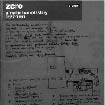Zero: A Martin Hannett Story 1997-1991
by Donny Kutzbach

Record producers are usually not the stars of the music industry. A life behind the mixing console can be well-paid but not so glorious, unless you are, say, “Mr. Wall of Sound” Phil Spector, whose patented sonic identity and colorful life made him a bigger name than most of the singers and musicians he worked with. Then there’s Phil’s punk rock equivalent: Martin Hannett. Hannett often described himself as a “Wall of Sound Merchant” in part as homage to Spector and in part as the most truthful assessment of what he did. It’s been 15 years since Hannett’s death but the sounds he helped sculpt couldn’t be more in the present tense, and the resonance of his sound is apparent in plenty of the younger bands of the moment. Making his base in Manchester, Hannett had his hand in many groundbreaking records; Zero is the first collection of its kind to offer a complete retrospective of Hannett’s remarkable but all-too-short career. His innovation and experimentation made him more than the average knob-twiddler and ultimately proves him, decades on, as the “Spector of post-punk,” a title he would no doubt be proud of. Beginning with 1977’s fevered punk pulse of Buzzcocks’ “Boredom,” one of the great opening salvos of English punk’s first year, and ending around the rise of Shaun Ryder and the Happy Mondays, with whom he knocked out the magnificently thuggish and cacophonously funky “Wrote For Luck,” Zero captures an across-the-board look at Hannett’s work. His greatest claim to fame could be as the de facto house producer for the fabled Factory Records imprint. Hannett cut landmark recordings with Joy Division (“Transmission,” with its sparse but explosive, dark beauty, is included here) and New Order as well as OMD, Vini Reilly’s the Durutti Column and the Names. Zero hits on some punk gems bound to find fresh ears, like Jilted John’s self-titled song and John Cooper Clarke’s rant “I Don’t Want to Be Nice.” On the other hand, it might surprise a few to find out that there are some artists and songs from Hannett’s resumé that scraped well into the mainstream, including a young band from Dublin, one of whose earliest songs was out to ape Joy Division (U2’s “11 O’Clock Tick Tock”) and a jangly masterpiece bound for teen movie glory (the Psychedelic Furs’ “Pretty in Pink.”)
|
Issue Navigation> Issue Index > v5n22: Summer Guide (6/1/06) > Left of the Dial > Zero: A Martin Hannett Story 1997-1991 This Week's Issue • Artvoice Daily • Artvoice TV • Events Calendar • Classifieds |









 Current Issue
Current Issue